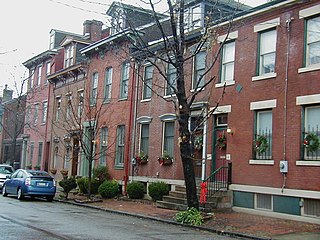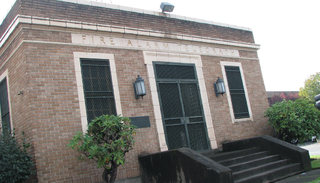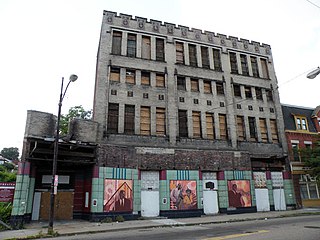
Dinkytown is a commercial district within the Marcy-Holmes neighborhood in Minneapolis, Minnesota. Centered at 14th Avenue Southeast and 4th Street Southeast, the district contains several city blocks occupied by various small businesses, restaurants, bars, and apartment buildings that house mostly University of Minnesota students. Dinkytown is along the North side of the University of Minnesota Twin Cities East Bank campus.

The Champaign–Urbana metropolitan area, also known as Champaign–Urbana and Urbana–Champaign as well as Chambana (colloquially), is a metropolitan area in east-central Illinois. As defined by the Office of Management and Budget (OMB), the metropolitan area has a population of 235,608 as of the 2023 U.S. Census Bureau estimate, which ranks it as the 201st largest metropolitan statistical area in the U.S. The area is anchored by the principal cities of Champaign and Urbana, and is home to the University of Illinois Urbana-Champaign, the flagship campus of the University of Illinois system.

Uptown is one of Chicago's 77 community areas. Uptown's boundaries are Foster Avenue to the north; Lake Michigan to the east; Montrose Avenue, and Irving Park Road to the south; Ravenswood Avenue, and Clark Street to the west. To the north is Edgewater, to the west is Lincoln Square, and to the south is Lakeview. Near the lake are some of the northern reaches of Lincoln Park, including Montrose Beach and multiple nature reserves. The area has a mix of commercial and residential development, and includes a well-established entertainment district of clubs and concert venues, and was a center for early film making. Truman College, a two-year city college, is located here, and the area's southwest corner includes the historic 19th century Graceland Cemetery.

East Liberty is a neighborhood in Pittsburgh, Pennsylvania's East End. It is bordered by Highland Park, Morningside, Stanton Heights, Garfield, Friendship, Shadyside and Larimer, and falls largely within Pittsburgh City Council District 9, with a few areas in District 8. One of the most notable features in the East Liberty skyline is the East Liberty Presbyterian Church, which is an area landmark.

The South Side Flats is a neighborhood in Pittsburgh, Pennsylvania's South Side area. It is located just south of the Monongahela River. The neighborhood has one of the City of Pittsburgh's largest concentrations of 19th-century homes, which has prompted outsiders to call the neighborhood the City's Georgetown. It includes many bars and restaurants as well as residences. The main throughway in the South Side Flats is East Carson Street. The street is home to a significant portion of Pittsburgh's nightlife.

Central Northside is a neighborhood in the North Side of the city of Pittsburgh, Pennsylvania. It has a zip code of 15212, and has representation on Pittsburgh City Council by the council member for District 6. Originally known as "The Buena Vista Tract", it is densely filled with restored row houses, community gardens and tree lined streets and alleyways.
The culture of Pittsburgh stems from the city's long history as a center for cultural philanthropy, as well as its rich ethnic traditions. In the 19th and 20th centuries, wealthy businessmen such as Andrew Carnegie, Henry J. Heinz, Henry Clay Frick, and nonprofit organizations such as the Carnegie Foundation donated millions of dollars to create educational and cultural institutions.

The Pittsburgh Cultural Trust (PCT) is an American, nonprofit, arts organization that was formed in 1984 to promote economic and cultural development in Downtown Pittsburgh, Pennsylvania. The "Trust" has focused its work on a fourteen-square block section known as the Cultural District, which encompasses numerous entertainment and cultural venues, restaurants, and residential buildings.
The Cultural District is a fourteen-square-block area in Downtown Pittsburgh bordered by the Allegheny River on the north, Tenth Street on the east, Stanwix Street on the west, and Liberty Avenue on the south.
The City of Oklahoma City uses Special Zoning Districts as a tool to maintain the character of many neighborhood communities.

Heinz Hall is a performing arts center and concert hall located at 600 Penn Avenue in the Cultural District of Pittsburgh, Pennsylvania. Home to the Pittsburgh Symphony Orchestra (PSO) and the Pittsburgh Youth Symphony Orchestra, the 2,676 seat hall presents about 200 performances each year. Originally built in 1927 as Loew's Penn Theatre, the former movie palace was renovated and reopened as Heinz Hall in 1971.

Kerns is a neighborhood in the inner Northeast and Southeast sections of Portland, Oregon. It borders the Lloyd District and Sullivan's Gulch on the north, Laurelhurst on the east, Buckman and Sunnyside on the south, and Old Town Chinatown on the west.

Lincoln Park is a neighborhood and public park close to downtown Denver, Colorado and the location of the Art District on Santa Fe. The neighborhood is one of Denver's oldest and is just to the south of the area where Denver was first settled in the 1850s. Many houses date from about 1900. The neighborhood is sometimes called "La Alma/Lincoln Park" or the West Side.

The Alger Theater is a historic theater at 16451 East Warren Avenue in the MorningSide neighborhood of Detroit, Michigan. It is one of only two remaining intact and unchanged neighborhood theaters in the city of Detroit. It was listed on the National Register of Historic Places in 2005.

One for the Money is a 2012 American crime comedy film based on Janet Evanovich's 1994 novel of the same name. Directed by Julie Anne Robinson, the screenplay was written by Liz Brixius, Karen McCullah Lutz, and Kirsten Smith. It stars Katherine Heigl, Jason O'Mara, Debbie Reynolds, John Leguizamo, Daniel Sunjata and Sherri Shepherd. The story revolves around Stephanie Plum, a broke and unemployed woman becoming a bail enforcement agent, going after a former high school crush who both skipped out on his payments and is a murder suspect.
Joshua Elijah Reese is an American actor.

Pittsburgh Playhouse is Point Park University's performing arts center located in Pittsburgh, Pennsylvania. It houses three performance spaces and is home to The Rep, Point Park's resident professional theatre company, as well as three student companies—Conservatory Theatre Company, Conservatory Dance Company, and Playhouse Jr. The Conservatory Theatre Company offers five productions each year that are performed by undergraduate students at Point Park; each season consists of a mixture of established plays and musicals, as well as occasional new works.

The New Granada Theater, which is located at 2007 Centre Avenue in the Hill District neighborhood of Pittsburgh, Pennsylvania, was built between 1927 and 1928.

Thomas H Scott was an architect in Pittsburgh, Pennsylvania. He is credited with designing the Benedum-Trees Building (1905) in downtown Pittsburgh at 221 Fourth Avenue. It was added to the List of Pittsburgh History and Landmarks Foundation Historic Landmarks in 1973. The Garden Theater (1915) in Pittsburgh's Central Northside neighborhood, also designed by Scott, was placed on the List of City of Pittsburgh historic designations by Pittsburgh City Council on March 25, 2008.

Paris Theatre, formerly Third Avenue Theatre and also known as Paris Theater or Ray's Paris Theatre, is an historic building in Portland, Oregon's Old Town Chinatown neighborhood, in the United States. The theatre was constructed in 1890 and opened as a burlesque house. It was later converted to a cinema, then a club and music venue, before serving as an adult movie theater until 2016. The building was a live venue and nightclub until it closed in October 2019.

















